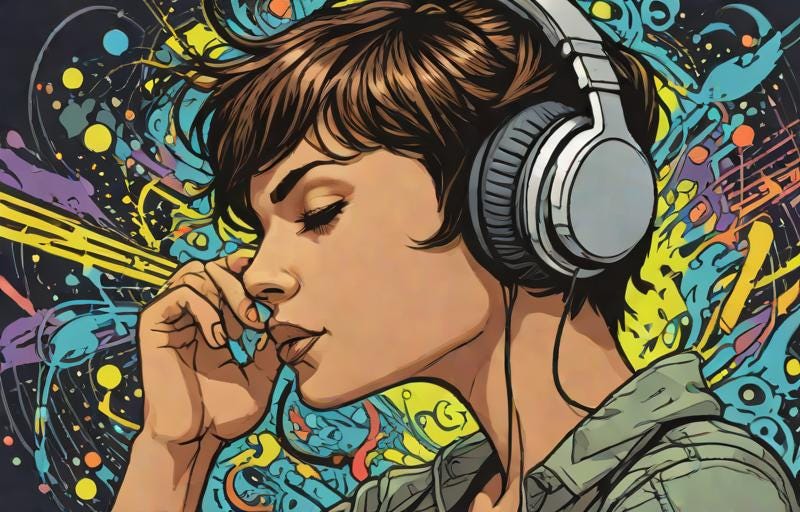Is Taylor Swift Autistic? Who cares? But here’s why we uniquely relate to her music.
The irresistible relatability of Taylor Swift lyrics for autistic, neurospicy and otherwise neurodivergent Swifties
Welcome to The Late Diagnosed Diaries, the bi-weekly-ish musings of a late-discovered autistic author and speaker, former journalist, and eternally curious human, featuring educational explanations, critical explorations, and vulnerable realizations, all seasoned with a teeny little dash of feminist rage.
There’s no shortage of discussion about Taylor Swift being an insanely talented songwriter.1 She’s a skilled storyteller and a master of wordplay, which allows her to beautifully articulate some of the more abstract emotions we all experience, from longing, love, and lust, to rage, regret, sorrow, pride, jealousy, and more.
But I haven’t seen a lot of formal discussion about the way that many autistics and other neurodivergent folks feel especially connected to Taylor Swift’s music2 and deeply seen by her lyrics.
Thanks to my autistic superpower of pattern recognition and predisposition to hyper-fixation, it only took one or two of TSwift’s lyrics to hit close to home before I was descending into a research rabbit hole so magical and deep that I wonder if I should have written a thesis instead of a newsletter…

Now, there’s a growing discussion online about whether Taylor herself may be autistic, but I’m not here to diagnose anyone. That’s not my job or my right.
Regardless of Swift’s neurotype, the way that many autistics (myself included) uniquely relate to her lyrics because of how we see our experiences and feelings represented is still valid.3
So here’s my probably-not-exhaustive-but-still-way-longer-than-I-originally-intended exploration of Taylor Swift lyrics that speak to the autistic experience.
Feeling Like An Outsider
One of the oddest experiences I’ve had as an autistic is being acutely aware of the fact that others are perceiving me as “off.” It might not even be conscious on their part, but I can feel it in their cautious conversation, their too-long pause, the smile that fades a little too quickly… When you’re autistic, sometimes you’re just different. And even if nobody says it, you can feel it.
Cause they see right through me, they see right through me, they see right through. (Archer)
You say “I don’t understand” and I say “I know you don’t” (You’re Losing Me)
I feel like everybody is a sexy baby, And I’m a monster on the hill. (Anti-Hero)
It’s like I’m 17, nobody understands. No one understands. (I Think He Knows)
She wears short skirts, I wear t-shirts. She’s cheer captain and I’m on the bleachers. (You Belong With Me)
I consider myself blessed to have been spared a lot of the traumatic bullying that many autistics face, but can see how some of Swift’s lyrics about being teased, mocked, or ignored would resonate deeply with autistics who’ve been ostracized more overtly:
No one wanted to play with me as a little kid. (Mastermind)
I'm 13 now and don't know how my friends could be so mean (The Best Day)
Luck of the draw only draws the unlucky and so I became the butt of the joke. (Daylight)
People look at me like I’m a monster. (Castles Crumbling)
Strangers’ silence makes me wanna take the stairs. (Ours)
Autistic people are more likely than others to feel lonely, whether they are physically alone or not. I know I have certainly felt like I’m “standing alone in a crowded room” the way Swift described in The Story Of Us. But these relatable feelings are echoed in countless other Swift songs:
You're on your own, kid. You always have been. (You’re On Your Own, Kid)
I’m alone on my own and that’s all I know ... Oh, I’m just a girl trying to find a place in this world. (A Place in This World)
I’ve been a lot of lonely places (The Outside)
And here I sit alone behind walls of regret. (Castles Crumbling)
You saw me there but never knew that I would give it all up to be a part of this, a part of you. (The Outside)
Chances are tonight you’ve already got plans. And chances are I will talk myself to sleep again. (Foolish One)
I’ve gotten used to no one callin’ my phone. I’ve grown accustomed to sleeping alone. (Electric Touch)4
One well-known stereotype about autistics is that we’re bad at relationships. Can’t make ‘em. Can’t keep ‘em. 🙄 Ignoring the fact that this is incredibly reductionist and not entirely accurate, it does cause a lot of autistics to have a sense of hopelessness that the loneliness they feel is permanent.
Lost I was born. Lonesome I came. Lonesome I’ll always stay. (Carolina)
This is how the world works, gotta leave before you get left (I Did Something Bad)
As a side note: The above is just a sampling of the loneliness that permeates a lot of Swift’s songwriting. It’s probably why Swifties have formed a fierce Defensive Line to protect Travis Kelce at all costs. Let Taylor love and be loved. She deserves it.
Masking
For women and AFAB autistics, social pressure to be social, friendly, accommodating, and submissive often contributes to masking—the conscious or subconscious act of hiding your autistic traits, deprioritizing your needs, and presenting a false self as a means of survival and acceptance.
Taylor is known to be an advocate for gender equality, and quite a few of her songs take aim at gender stereotypes and unfair societal expectations placed on women. I heard the textbook description of what my mask should look like in Vigilante Shit when she sang, “Ladies always rise above. Ladies know what people want. Someone sweet and kind and fun.”
Taylor’s lyrics never explicitly mention “autistic masking,” but her song mirrorball seems like an ode to the masking autistic throughout:
I'm a mirrorball, I'll show you every version of yourself tonight …
I want you to know, I'm a mirrorball, I can change everything about me to fit in …
I'm still on that trapeze, I'm still trying everything, To keep you looking at me …
Though no other songs feel as overtly resonant with the experience of masking as mirrorball, plenty of lyrics in other songs make brief references to it:
I prefer hiding in plain sight. (Dear Reader)
And I wouldn’t marry me either, a pathological people-pleaser, who only wanted you to see her. (You’re Losing Me)
And it's fine to fake it 'til you make it, 'Til you do, 'til it's true (Snow on the Beach)
I know how to act like I’m fine…. And it’s delicate, but I will do my best to seem bulletproof. (Foolish One)
There are also plenty of references to forced smiles, inauthentic facial expressions, and hidden feelings, which are some of the most common tactics employed while masking:
There I was again tonight, forcing laughter, faking smiles. (Enchanted)
My cheeks are growing tired from turning red and faking smiles (Nothing New)
He can’t see the smile I’m faking, and my heart’s not breaking, cause I’m not feeling anything at all (The Way I Loved You)
For autistics who express themselves verbally, masking often involves saying things that aren’t true, and many autistics also experience something called selective mutism, where they find themselves unable to talk in high-stress situations. I found both of these experiences popping to mind as I binged my way through my Taylor Swift playlists:
Said I’m fine but it wasn’t true. I don’t wanna keep secrets just to keep you. (Cruel Summer)
Cause it’s all over, it’s not meant to be. So I’ll say some words I don’t believe. (Bigger Than The Whole Sky)
Cause you still don’t know what I never said. (I Wish You Would)
The Sheer Effort Of Existing
I have often felt as if everyone else got a hefty “how to be a human” guidebook at birth while I’ve had to cobble together my own insufficient version by learning each rule the hard way, like an alien plopped into a new civilization. (Oliver Sachs famously wrote about Temple Grandin’s autistic experience under the headline “An Anthropologist on Mars.”)
It can be hard to describe that feeling of having to decode the world live as you’re moving through it, but Swift captures it beautifully with analogies of puzzles, chess games, and math equations:
I pull at every thread, trying to solve the puzzles in his head. (Forever Winter)
I lived in your chess game, but you changed the rules every day. (Dear John)
And the touch of a hand lit the fuse, Of a chain reaction of countermoves, To assess the equation of you. (Mastermind)
In this way, simply existing as a neurodivergent person in a neurotypical world requires constant attention and effort. And let me tell you, that is EXHAUSTING.
I’ve never been a natural, all I do is try, try, try. (mirrorball)
I just wanted you to know, That this is me trying. I just wanted you to know, That this is me trying. (This is me trying)
I’m trying hard not to look like I’m trying, cause every time I tried hard for love it fell apart. (Electric Touch) [See footnote 4 again]
I’ve been scheming like a criminal ever since/ To make them love me and make it seem effortless. (Mastermind)
Unclear Sense of Self
The effect of all this masking and pretending is that many autistics feel a loss of self, or become unclear about where the pretending ends and the “true them” begins.
This was certainly true for me. Shortly after my late diagnosis, I began a rigorous process of self-discovery and “unmasking” that continues to this day: weekly therapy, journaling, reading, researching,
In countless songs, Taylor refers to these kinds of reinventions.
I’d like to be my old self again but I’m trying to find it. (All Too Well)
Find out what you want, be that girl for a month. (Blank Space)
Keep you guessing like who is she? (Blank Space)
I can’t face reinvention. I haven’t met the new me yet. (happiness)
And if you don’t recognize yourself that means you did it right. (Dear Reader)
And when you spend so much time pretending to be someone else out of necessity, finding a “safe person” with whom you can truly be yourself, and who makes you feel seen and known, is a magical experience.
That experience is best represented in a song from Swift’s self-titled debut album — I’m Only Me When I’m With You — where she wrote “When I’m with anybody else, it’s so hard to be myself.“ The song is about Swift’s own best friend, but if you’ve been lucky enough to find your own safe person as an autistic, you’ll undoubtedly see their face when you’re listening to this one.
Another shoutout to mirrorball is necessary here. If you take the refrain literally (which we do, because we’re autistic) the chorus gives the most perfect description of unmasking when you’re around a safe person: “When no one is around, my dear, You'll find me on my tallest tiptoes, Spinning in my highest heels, love, Shining just for you.”
If you read this far, you’d probably be one of my safe people. 💜
You May Also Like:
I joined the Hits Differently Podcast to talk about this topic for the episode they dropped on World Autism Day:
My pals over at
also did an episode on this topic:This quote from her Wikipedia page sums it up pretty well: “One of the world's best-selling musicians with 200 million records sold, Swift has earned 117 Guinness World Records and received the Global Recording Artist of the Year award three times from the International Federation of the Phonographic Industry. She is the highest-grossing female touring act, the most-streamed woman on Spotify and Apple Music, and the first billionaire with music as the main source of income. The 2023 Time Person of the Year, Swift has appeared on lists such as Rolling Stone's 100 Greatest Songwriters of All Time, Billboard's Greatest of All Time Artists, and the World's 100 Most Powerful Women by Forbes. Her accolades include 12 Grammy Awards (including three Album of the Year wins), 1 Primetime Emmy Award, 40 American Music Awards (including Artist of the Decade – 2010s), 40 Billboard Music Awards, and 23 MTV Video Music Awards. Swift is a philanthropist and an advocate for artists' rights and women's empowerment.”
Plenty of ADHD, Autistic, and other neurodivergent Swifties have tried to articulate online why her more recent music is particularly “stimmy” or “tickles their brain.” It could be her use of repetition or the perfect combination of familiarity and novelty of the (Taylor’s Version) re-releases. But she also makes masterful use of immersive 8D audio, where the music shifts from ear to ear and seems to come from multiple points and distances. This mixing effect has been reported to cause relaxation, stress relief, positive feelings, and improved focus, especially for neurodivergent brains.
Also, just as I was writing this part, “You Belong With Me” came on the radio, so I’m taking that as permission to proceed.
This particular line in the collab was sung by Fall Out Boy, but again, Taylor’s writing is what we’re mainly focused on so it still counts in my book.










Absolutely! Great list. I love posts that are about the overlap of two of my special interests, Taylor Swift and autism!
Loved this. Thanks